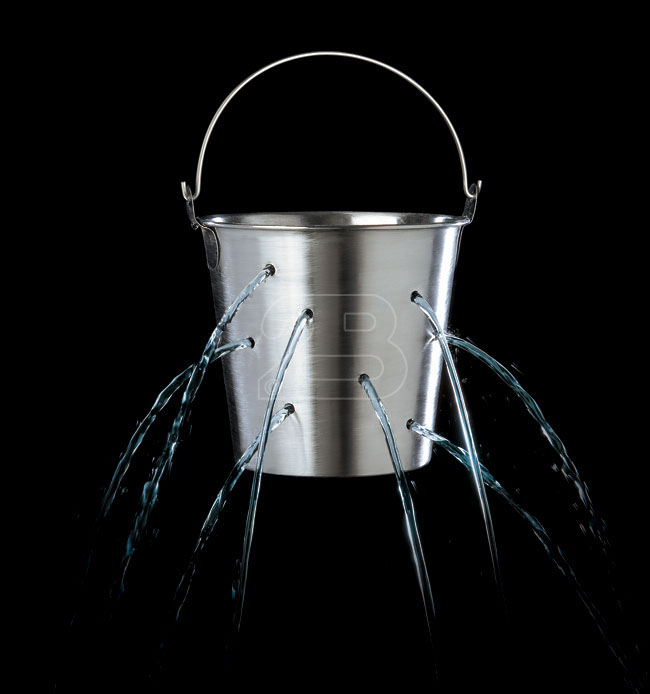
Informed Decisions are one of Ireland’s only remaining independent financial advice firms. We specialise in retirement & investment planning for successful individuals, so that our clients only have to retire once.
Retire successfully with Informed Decisions.
26th July 2021

‘There’s a Hole In The Bucket Dear Liza’ was a song my grandmother used to sing to my cousin Liza when we called down to her in county Laois, that line of the song has stayed with me since! I only recently came across the original song by Harry Belafonte and Odetta Holmes. It’s not as good a version as my granny’s! Bucket’s are relevant in your financial life too, if you bear with me a minute!
Your entire financial life will boil down to one binary question; will you run out of money, or not? It’s an incredibly complex question once you get into it, with many variables. Some of those variables are within our control, others are not. One of the biggest variables (in my view) is the level of awareness we have on where we are, versus where we want to be, financially speaking. That includes an awareness of how our financial resources are aligned to our financial lives. Do we know basics such as:
You could argue that these are the ‘101 of Financial Planning’ but I believe each is an important question to consider to improve the probability that we will live successful financial lives.
Morgan Housel is a US author that caught my attention about 5 years ago. I then got to see him ‘live’ at the Nucleus Conference in September 2019 (Podcast 153), and he was equally impressive. He published a book recently ‘The Psychology Of Money’, and it’s a cracker. If I was to write a book, it’d be this one!! One of the most interesting aspects of the book for me was his references of the findings of two pieces of research:
1) Angus Campbell’s book ‘The Sense of Well-being in America’. One of the key findings was that the biggest influence on people’s sense of happiness/well-being was their ability to control their own life; what they did, when they did it, and whom they did it with. That was the single biggest determinant of people’s satisfaction with life. Not assets, not size of pension pot (though it’s certainly relevant!), and certainly not the model of car they had in their drive-way! It was telling, not surprising, but telling.
2) Dr. Karl Pillemer’s book ‘30 Lessons For Living‘ from 2011. This researcher interviewed one thousand elderly people to glean lessons that the rest of us might learn from. I have it in my list but have yet to read this one. Housel’s summary was that not a single person in the 1,000 said that they wished they had worked more hours so they could have more money so they could buy more stuff, or live in bigger houses. The vast majority said that they valued most the relationships they had over their lives, and the single biggest thing they valued was spending TIME with the ones they loved.
Reading and hearing these types of research only reinforces the claim that we may be best served aligning our capital with our lives. Seeing money as a resource to be allocated and consumed in the pursuit of our priorities is surely the way to go.
The conclusion could be drawn; success is using/spending money to buy time and to give us options, is the single best thing we can do with it, and which will deliver the best returns for us as humans. To share a personal example; Fiona is taking a career break next academic year. It will cost us about €20k when all is said and done for her to do that. So, an investment of €20k to have a full 12 months at home with our family at the age that they are at, is for us, a no brainer. We will cut back on some expenses, we will delay a project, and will be delighted to do so as the return is far more than we would otherwise hope to get on that money. Align money with life.
Paul Armson is a UK coach to Financial Advisors, does the speaking circuit etc etc. He has shared some good concepts over the years; one of which is a nice way to summarise one’s financial life; The Bucket. It’s kinda hard to explain without a white-board and marker, but I hope the below is some-bit comprehensible!

Part 1: Sitting In The Bucket: Your Accessible Assets:
Imagine that any and all cash or accessible assets you own are sitting in the bucket as water, filling it up maybe one third of the bucket. This is all current accounts, deposit accounts, shares or other investments you can sell today if you needed to. Basically anything that you can take out of the bucket and convert to buy food or cover living expenses today, that is sitting there in your bucket right now.
Part 2: Topping-Up The Bucket: Your Inflows:
Next is to imagine water coming into your bucket, this is your regular incomes; employment, rental, investment dividends or state benefits. These inflows are coming regularly and reliably, and serve to top-up your accessible resources sitting in the bottom of your bucket on an on-going basis.
Part 3: Outside Your Bucket
Anything that is not sellable or fully accessible today is still part of your financial life, but is not sitting in your bucket right now. Your home (which you could argue is a liability as opposed to an asset as it costs you money to keep!), is not accessible resources, so it sits outside your bucket. If you decided and were able to ‘down-size’ in future years, it may generate an inflow into your bucket, but otherwise it will likely remain outside your bucket for the rest of your life.
Your Pension, whether a Defined Contribution or Defined Benefit scheme, also sits outside your bucket. You either can’t or won’t likely ever take the entire scheme and put it into your bucket in one go, so it too will mostly sit outside your bucket for the rest of your life too! Apart from maybe taking a tax free lump sum of it, it’ll stay outside your bucket. (Read Blog 171 for insights on taking tax free lump sum or not).
Separate to the pension you may also have a business with a sellable value at some point in the future. Again, unless you sell the business and bag the proceeds, or were able to run a solvent liquidation on it, this value too will stay outside your bucket. If you did sell/liquidate, the proceeds will be added into your bucket, topping-it up potentially hugely.
Aside from pension, business and home, you may also have other investments which are not ideally accessible right now, that will flow into your bucket at some point in the future if and when you need to use them. Until then, they too sit outside the bucket.
Part 4: The Taps – Draining Your Bucket!
Up to this point all we have been talking about are inflows into the bucket, and not the outflows, of which we all have many! At various stages of life we will have taps that are draining our bucket, using up the accessible resources on an on-going basis.
Lifestyle Expense Tap: Our lifestyle expenses will fluctuate (at least somewhat) as our lifestyle and demands on our resources change. This will result in the bucket getting drained at different rates through our lifetimes. At some points our tap could be letting out more water than our regular inflows, so we may need to liquidate some of our other assets outside our bucket to ensure the bucket doesn’t run dry! The flip of that is when our outflows are less than our regular inflows, our bucket can get very full and unwieldy. A healthy balance will see us maintain our bucket at a level somewhere between those two points.
One-Off Expense Tap: A major future drain on your bucket will occur if you wish to gift/donate/give-away a significant portion of your resources. If this will drain your bucket entirely, you’ll need to liquidate some of those resources sitting outside your bucket.
Retirement Expense Tap: Depending on your plans for this stage of life, this tap could be significant drain on your bucket. Granted, you’ll hopefully have a decent inflow coming from your pension resources, and possible business sale etc, but this tap will need to be allowed for in your plans.
Later Life Expense Tap: Another tricky one to prepare for. Long Term Care tap for example can be gushing! Can drain anything in your bucket, plus any and all resources sitting outside your bucket, even your home of course.
The Balance:
Going back to our earlier points, ideally we want to ensure that we get to use the resources in our bucket to fund the lifestyle and the choices that we want to have in life. I view it as a disaster if we turn off all the tap as tightly as we can, only to die with a bucket that is over-flowing – what a waste of life!
Likewise, it would be no fun to drain our bucket dry well before we die – limiting the choices and autonomy we would have in the years that we might want it most.
Financial Planning is ultimately less about managing your resources such as investments and pensions, and more about helping with the overall decisions and strategy around your bucket – helping you to keep that bucket topped-up nicely, not running dry, and not over-flowing!
Simply put, it’s about aligning your money with your life, giving the best returns ever. There’s a hole in the bucket dear Liza, and I hope you are enjoying it!
Paddy.
Informed Decisions are one of Ireland’s only remaining independent financial advice firms. We specialise in retirement & investment planning for successful individuals, so that our clients only have to retire once.